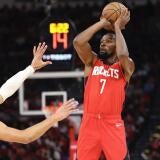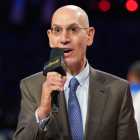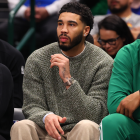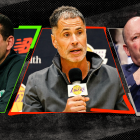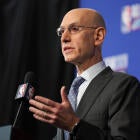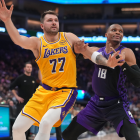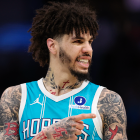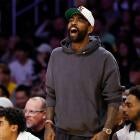Ranking all 30 NBA teams by playoff potential: Why only one team stands out above the rest
Some teams are built for the regular season, and some are built for the playoffs
Only five of the past 15 NBA champions have had the best record during the regular season. In that same span, more teams have won the title without a No. 1 seed (seven) than have with the league's best regular-season record. Meanwhile, 14 teams have gone into the postseason with 20 or fewer losses in that period, and only six left with championships.
This is, historically speaking, an anomaly. From 1970 through the end of the 20th century, No. 1 seeds won 24 out of a possible 30 championships. A No. 1 seed won every championship in the 1980s, and the team with the NBA's best record took eight of them.
This disconnect points to a growing chasm. While regular-season and playoff basketball used to be relatively similar, the two have since diverged into fundamentally different games. Over the past several years, four key trends have emerged. To win in the postseason, teams need:
- A one-on-one shot-creator. As defenses lock in late in postseason games, especially with stoppages making situational substitutions so much easier, team offense becomes much harder to run. Nobody is falling for back-cuts in the final minute of a playoff game, so having someone who can break down a defense independently is critical. This was especially evident last season. C.J. McCollum was able to carry the Blazers in the final minutes of his second-round series against the Nuggets, who relied on Nikola Jokic to generate points in an egalitarian system. Kawhi Leonard's shot-making won Toronto a championship.
- Concentrated depth. Benches shorten in the playoffs. Having 11 or 12 contributors, as Denver does and did last season, is helpful in the regular season because it allows players to rest more easily. But when the postseason rolls around, rotations shorten to seven or eight players. The Raptors relied on seven players last postseason along with an occasional eighth (Norman Powell). The Warriors have typically leaned on the Hamptons Five, Shaun Livingston, and two big men.
- Front-court versatility. The Warriors won three championships because Draymond Green is capable of playing power forward and center at the same time. He is capable of doing everything that a center does on defense, but with far more skill than most big men, allowing his team to put unstoppable offensive lineups on the floor with him and four shooters. An ideal playoff team should have the capability of playing small without being vulnerable to size and playing big without being vulnerable to speed.
- Wing depth. If the best playoff teams all have star one-on-one scorers, then it stands to reason that the path to opposing them would include players capable of stopping them. Teams need to be able to produce 48 minutes of quality defense against top opposing scorers, ideally in a way that won't compromise their offense through over-exertion.
Now that we've established what kinds of teams win in the playoffs, let's look at how well-positioned each team is to actually win when they get there. These rankings are entirely independent of the regular season, and will not reflect standings at all. They are based purely on each roster's readiness for the postseason:
They aren't making it anyway
30. Charlotte Hornets
29. New York Knicks
28. Memphis Grizzlies
27. Washington Wizards
26. Cleveland Cavaliers
25. Phoenix Suns
24. Chicago Bulls
The Knicks only have front-court versatility because they signed every front-court player on the market. Any playoff readiness these teams might have is wasted considering how far away they are from actually reaching the playoffs.
They get their own tier because they're better than the Knicks
23. Detroit Pistons
22. Oklahoma City Thunder
21. Orlando Magic
All three of these teams actually made the playoffs last year, but the Pistons melted down without Blake Griffin, who isn't the sort of one-on-one shot-creator who tends to succeed in the playoffs. The same goes for the Magic with Nikola Vucevic. The Thunder have four players who could help a playoff team but none who could lead one.
Maybe if their young guys take an enormous leap
20. Atlanta Hawks
19. Minnesota Timberwolves
18. Sacramento Kings
17. New Orleans Pelicans
16. Dallas Mavericks
The bones are strong. One day, Karl-Anthony Towns is going to be a matchup nightmare in the playoffs. Trae Young will gain enough weight to attack the basket consistently. De'Aaron Fox will improve his shot enough to generate space. But realistically, both these stars and their supporting casts are a few years away.
The Pelicans and Mavericks get a slight bump for leading the way in at least one area. Dallas has two superstars that both check off a box here. Luka Doncic is your scorer, Kristaps Porzingis is your matchup-proof big man. The Pelicans have the deepest and most versatile supporting cast, but the problem is that it's too deep. There is a killer top eight somewhere on that roster, but they don't know what it is yet and won't know for at least another year. Right now, there are no fewer than 14 players on this team expecting real playing time, and the Pelicans don't know how any of them will fit together.
Low ceilings
15. San Antonio Spurs
14. Indiana Pacers
13. Toronto Raptors
12. Miami Heat
San Antonio and Indiana both broadly fit some of the trends mentioned, but fail upon closer examination. They were the two league-leaders in the dreaded "long-two," defined as any two-point shot beyond 16-feet. LaMarcus Aldridge, DeMar DeRozan and Victor Oladipo, despite their ability to create these shots independently, are major offenders. Players like McCollum and Leonard helped bring mid-range shots back into vogue last postseason, but were able to do so only in conjunction with the more efficient shots the rest of their team was taking. But the Spurs and Pacers were dead last in the NBA in 3-point attempts, and the Spurs were last in shots within three feet of the rim. That just makes their offenses anachronistic despite the star power.
Miami and Toronto are far more forward-thinking, but neither has a player who made an All-NBA team last season. Jimmy Butler held his own against Leonard in a seven-game series and may still be at that level. Pascal Siakam was a capable sidekick for Leonard and could potentially reach it. But the caliber of player we are looking for here is not "lost to Kawhi" or "assisted Kawhi," it's just "Kawhi." Neither of these teams have anyone capable of going toe-to-toe with someone like that and winning yet, and neither has the assets to get such a player in the immediate future.
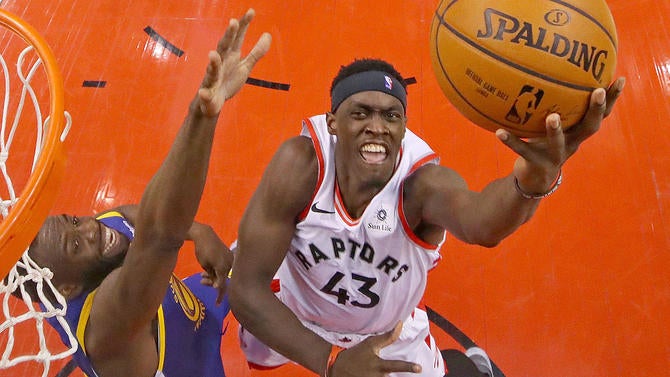
Defense … ever heard of it?
11. Portland Trail Blazers
10. Brooklyn Nets
The Blazers don't have a small forward on their roster. Go look for one -- I'll wait. A team with championship aspirations in the same conference as LeBron James, Kawhi Leonard and Paul George somehow decided that trading Mo Harkless for Hassan Whiteside made sense, and that re-signing Rodney Hood was a higher priority than Al-Farouq Aminu. They have no way of countering the two best teams in their conference.
Brooklyn's defense is at least theoretical. Maybe young players like Jarrett Allen and Taurean Prince take a leap. Maybe older players like DeAndre Jordan and Wilson Chandler discover their old form. They have the assets to improve in this area. But for now, even if Kevin Durant were healthy, this team is too unbalanced to make real noise in the postseason.
The wild cards
9. Boston Celtics
8. Houston Rockets
The Celtics are one defensive-minded center away from true contention, but there is no reason to believe they can't find one. They still have a valuable future first-round pick from the Grizzlies to dangle in trades, and can aggregate plenty of salary with Enes Kanter and their incoming first-round picks without touching their core. If they find one, every box is checked. They have more wings than just about anyone and a go-to scorer late in games in Kemba Walker.
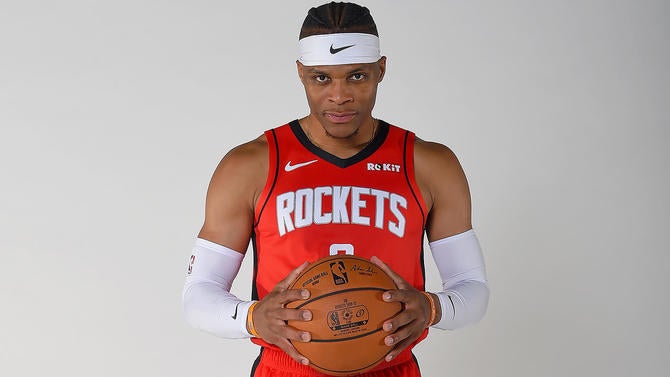
The Rockets meet many of the criteria listed above, but come with more red flags than any other team. They're versatile, but vulnerable, as Clint Capela has struggled against well-spaced playoff lineups defensively, while P.J. Tucker at center lineups have been killed on the boards. Daryl Morey is good at finding depth during the season and Mike D'Antoni stretches his top players very thin, but the fact remains, they have only five surefire playoff-caliber players at the moment. There are real questions about the fit between their two best players as well, and until those questions are answered on the floor, Houston can't be viewed as a true contender.
Champions aren't crowned in April
7. Utah Jazz
6. Denver Nuggets
5. Philadelphia 76ers
4. Milwaukee Bucks
There is a reasonable chance that this group posts the four best records in the NBA. Denver, Utah and Milwaukee are all incredibly deep. The 76ers can't match any of them on the bench, but have the league's most talented starting lineup. Giannis Antetokounmpo is the reigning MVP. Nikola Jokic and Joel Embiid are candidates for future MVPs, and while Donovan Mitchell isn't on their level yet, he has been among the most-hyped players on Team USA. But they all have the same fatal flaw when it comes to the postseason.
The Jazz have twice run into Houston's switching defense in the playoffs. Twice, they've been completely shut down. They scored only 99.2 points per 100 possessions in 2018's matchup, and 101 in last season's. Both would be the lowest mark in the NBA over a full season. Denver's problems were concentrated more in crunch time. They scored 115 points per 100 possessions in the first half of playoff games this season, but that number fell to 108.6 in fourth quarters. Not bad, but they don't have Utah's elite defense to fall back on. In both cases, their offenses suffered because neither team had an elite one-on-one scorer.
The Bucks encountered this same flaw against the Raptors. Milwaukee ran roughshod over the entire NBA all season until Leonard took on the task of defending Antetokounmpo. A Bucks offense that scored 113.6 points per 100 possessions in the first two rounds of the postseason fell to 102.3 in those last four Raptors games. In just the fourth quarters of those games, that number dropped further to 91.3. Milwaukee's entire offense revolved around the gravity Antetokounmpo generated. Once Leonard negated it, they, too, were left without an answer.
The 76ers should know this phenomenon well. Jimmy Butler served as their closer last season, and was very effective in that role. They did well to get Josh Richardson back for him if the alternative was losing him for nothing, but the 76ers don't have anything resembling a replacement for Butler now. Until they either develop or find one, they fall into the same bucket as the rest of these teams.
There are other flaws to consider with each as well. Rudy Gobert struggles against small lineups. Denver took great steps to avoid Houston last year, and for good reason, because Jokic defending on the perimeter against a heavy pick-and-roll and isolation team like the Rockets would be disastrous. The Bucks lost one of their best players in Malcolm Brogdon and seem startlingly unconcerned by it. The 76ers have no bench and are hoping one materializes by spring.
But these are the sort of flaws that most championship teams can overcome. Lacking a go-to scorer when it counts is a different story. If any of these teams can find one, their championship odds increase dramatically. Otherwise? This is their ceiling.
You have our attention
3. Golden State Warriors
2. Los Angeles Lakers
A misleading stat made the rounds during the NBA Finals. After Stephen Curry missed a potential game-winning 3-pointer in Game 6 against the Raptors, the world was quick to note that Curry had never hit a go-ahead shot in the final 24 seconds of a playoff game. This is technically true, but it implies that Curry is not a go-to scorer in clutch situations.
That is patently false. This postseason was an anomaly given the injuries the Warriors sustained, but in league-defined clutch situations during the playoffs, Curry's field goal percentage and 3-point percentage both increased relative to his overall regular-season and postseason numbers in each of the three prior seasons.
| STEPH CURRY | REG. SEASON CLUTCH | POSTSEASON CLUTCH |
|---|---|---|
2015-16 | 44.2 FG%, 38.1 3FG% | 53.8 FG%, 56.3 3FG% |
2016-17 | 44.1 FG%, 39.3 3FG% | 75.0 FG%, 60.0 3FG% |
2017-18 | 51.5 FG%, 40.9 3FG% | 54.5 FG%, 66.7 3FG% |
Curry tends to take a slight step back in terms of regular-season clutch numbers, but that is true across the board. When Golden State's offense was built around him for the 2015-16 regular season, he was arguably the league's best clutch player, scoring more points on higher shooting percentages than either LeBron James or Kevin Durant even with the decline from his ridiculous baseline. His playoff clutch numbers, even with the smaller sample size factored in, are absurd.
So make no mistake, Curry is perfectly capable of leading a playoff offense, and assuming Klay Thompson returns in time for the postseason, the Warriors are going to be the most dangerous six- or seven-seed in league history. They still need to sort out their bench and their defense, and D'Angelo Russell remains a questionable fit, but this three-man core won 73 games in a season. It will be heard from in the playoffs.
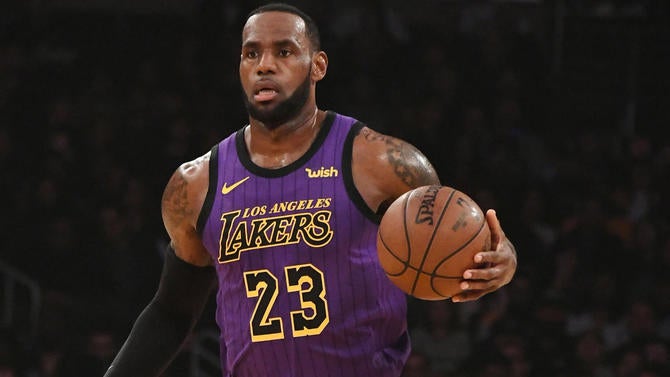
And so will the player who beat them in that 73-win season. There are few greater advantages in the playoffs than having LeBron James. He and Michael Jordan are the only post-merger players to ever average 34 or more points in multiple playoff runs. He averaged a triple-double in the NBA Finals. He won the Eastern Conference with a roster that won 19 games in the season after he left.
The rest of his roster wasn't ready to compete yet. It is now. Anthony Davis makes them matchup-proof in the front-court. The James-Davis pick-and-roll, with three shooters around it, is going to be the most unstoppable play in basketball this year. How exactly all of the pieces fit together is unclear, but the Lakers spread their cap space out this summer among several players. If they wind up with six or seven good ones, they'll be able to figure out the rest at during buyout season. Not only should the prospect of contending in Los Angeles appeal to free agents, but the Lakers could have a financial advantage as well. The loss of DeMarcus Cousins hurts, but it allows them to apply for a Disabled Player Exception of $1.75 million that could be quite helpful in February.
Both teams have flaws. The Lakers don't have enough defense at the forward spots. The Warriors are relying on a lot of gambles on their bench. James and Curry are getting older. But the talent and fit at the top of these rosters is nearly flawless for postseason play. They can put five-man lineups on the floor that most teams simply can't match.
And it's not even close
1. Los Angeles Clippers
The Clippers are probably not going to wind up with the best record in the league. Paul George is still recovering from shoulder surgery. Kawhi Leonard will probably miss a few games to stay fresh. They don't have a pure point guard on the roster, and that is going to hurt them in the regular season, when Leonard and George play smaller roles offensively.
But when April rolls around, look out. This team is a juggernaut. Leonard and George are arguably the two best perimeter defenders in basketball. Patrick Beverley isn't far behind. They have a center for all situations. A traditional big in Ivica Zubac, an athletic freak in Montrezl Harrell, and a modern three-and-D sort of center in JaMychal Green. They even have the league's best bench scorer in Lou Williams.
There are some slight nits to be picked. Their passing leaves something to be desired, and some of their role players are a bit one-dimensional, but those are relatively minor gripes. This team was built to win in June. That doesn't guarantee that they will, but on paper, it is the best playoff roster in the NBA.





